#Madame Vestris
Text
Eighteen-Thirties Thursday: Girls Will Be Boys

'Behind the Scenes': an 1838 print by Paul Gavarni, showing an actress playing a male role telling her assistants to hurry up (Rijksmuseum). I enjoy the look at her neckwear being tied (and the shirt frill, although this is the twilight of frilled shirts in menswear).
Aside from fancy dress balls, which seemed to be full of women wearing male costumes and Turkish trousers, the stage was where a Romantic-era woman could be found in masculine attire. Many popular actresses were male impersonators.
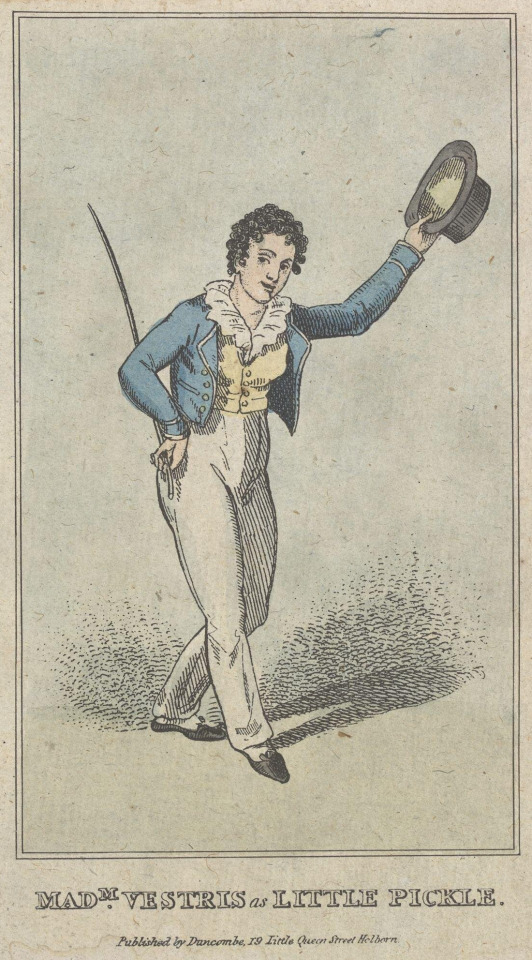
Madame Vestris (Lucia Elizabeth Vestris) as Little Pickle in The Spoiled Child, ca. 1830 (V&A)

Mary Anne Keeley as Jack Sheppard the notorious highwayman, 1838 (British Museum).
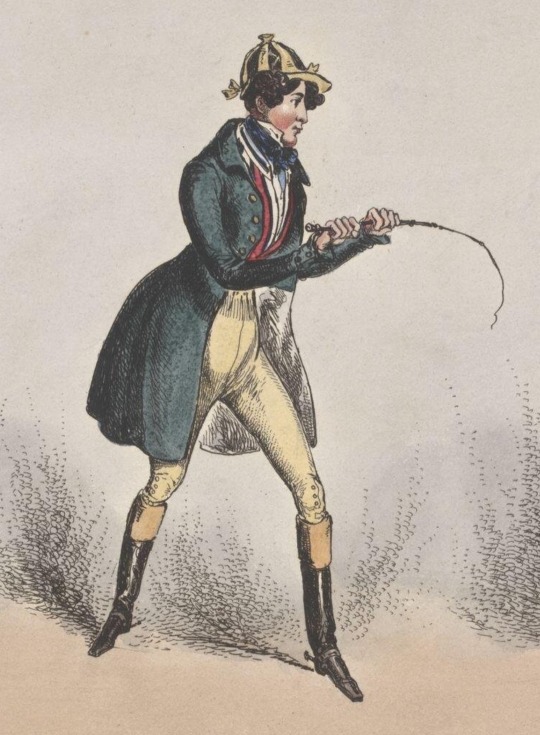
Maria Foote as 'The Little Jockey', 1831 print of leading ladies (detail). (V&A) This particular character seems to have a lot of merchandise and prints.
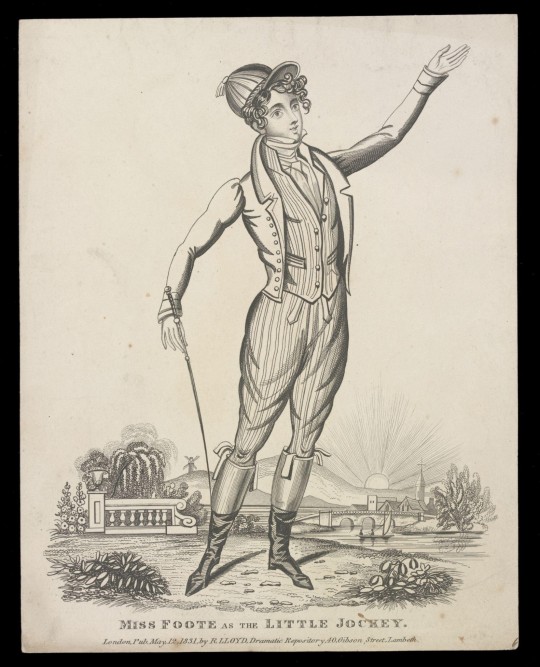

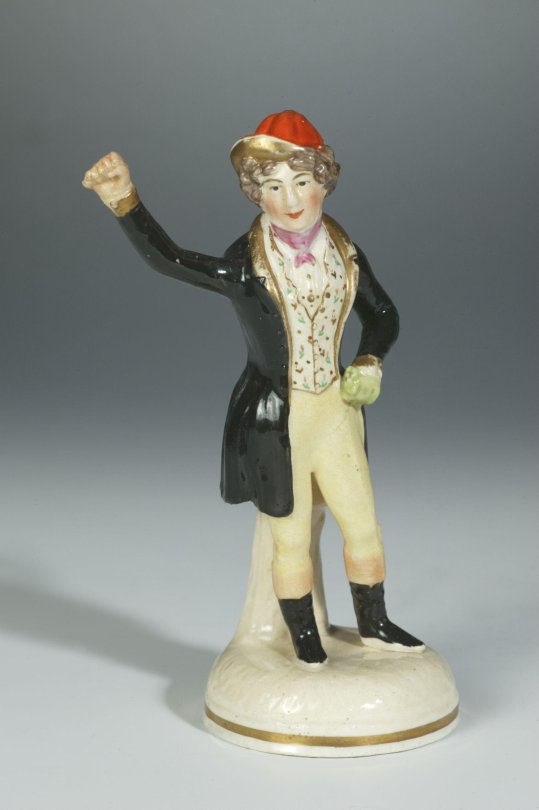
Madame Vestris again (V&A), in a circa 1830 print, reminding us that there was also a contemporary song about her legs.
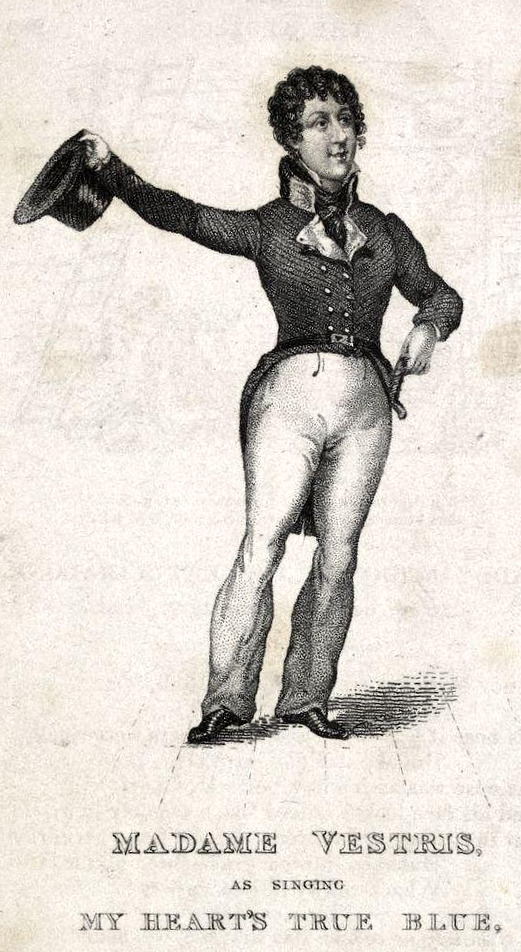
Finally—if you remember the uh, very creative play about the arctic adventures of Sir John Ross and his nephew, which appeared in a toy theatre kit in the mid-1830s (hat tip to @handfuloftime), the role of "Clara Truemore", love interest of the captain's nephew James Clark Edward Ross, is a breeches role, and Clara spends most of the play disguised as "Harry Halyard."
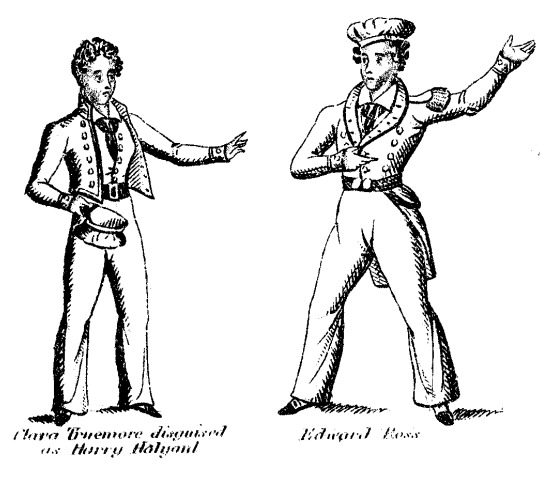
I feel like there is something inherently queer about this, despite the long tradition of "Sweet Polly Olivers" in male drag pursuing their lovers in ballads and broadsides. I wonder how the audience perceived these characters.
#Eighteen-Thirties Thursday#1830s#theatre#breeches roles#gender#fashion history#men's fashion#romantic era#crossdressing#paul gavarni#madame vestris#mary anne keeley#maria foote#captain ross#en travesti
662 notes
·
View notes
Text
Anna Cora Mowatt and “All That Glitters is Not Gold”
Anna Cora Mowatt and “All That Glitters is Not Gold”
Part I: John Maddison Morton and His Other Play
In any well-rounded streaming service that delivers movies, the romantic comedy is a category that holds a place of pride. Even if you don’t particularly care for the genre, you are probably quite familiar with its stock characters, typical plotlines, and can even reel off a few of its most popular tropes. In the 1840s and 50s, however, this…
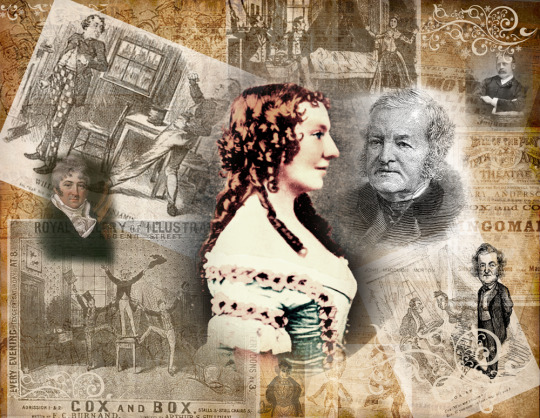
View On WordPress
#All That Glitters is Not Gold#anna cora mowatt#Box and Cox#Charles Matthews#epes sargent#Fanny Vining#James Buckstone#John Maddison Morton#Madame Vestris#Marylebone Theater#rles#Royal Olympic Theater#Speed the Plough#The Lady Actress#theater history#theatre history#theatrical autobiography#Thomas Morton#Victorian Actress#Victorian Literature#Victorian theater#victorian theatre#Walter Watts#Watts Scandal
0 notes
Photo
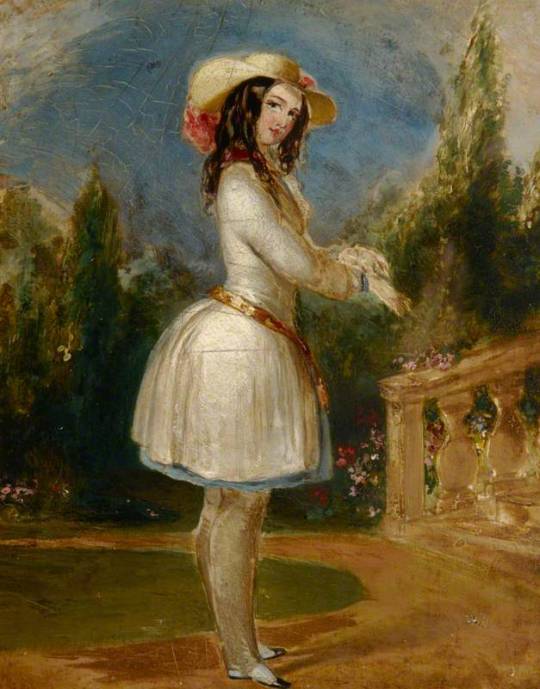
Lucia Elizabeth Vestris (1797–1856), 'Madame Vestris', as Don Mazzerio
British (English) School
National Trust, Smallhythe Place
97 notes
·
View notes
Text
#23GloPoWriMo
28/4/24
Day 28 Response 1 Poem 34
****
Prompt :
Have you ever flipped to the index of a book and found it super interesting? Well, I have (yes, I live an exciting life!) For example, the other day I pulled from my shelf a copy of on old book that excerpts parts of Ralph Waldo Emerson’s journals. I took a look at the index, and found the following entry under “Man”:
fails to attain perfection, 46; can take advantage of any quality within him, 46; his plot of ground, 46; his use, 52, 56; not to be trusted with too much power, 55; should not be too conscientious, 58; occult relationship between animals and, 75; God in, 79, 86; not looked upon as an animal, 80; gains courage by going much alone, 81; the finished, 89; and woman, distinctive marks of, 109; reliance in the moral constitution of, 124; the infinitude of the private, 151; and men, 217; should compare advantageously with a river,
Write your own index poem. You could start with found language from an actual index, or you could invent an index, somewhat in the style of this poem by Kell Connor.
Sharp air. Marigold, the scent of the other world, the underworld, on a clear day. Lilac, soft red wheat. She will miss it: The carnal, that char of desire. That bitter register, the marigolds again, the color of cartoon flames. Body heat trapped beneath a worn quilt. I go into the next room and its the same room repeatd, she writes. That's the softness of this world, or all she can know of it. It's as fragile as foam. Where her form ends something else begins in the warm air. or I go into the next room and its the same room repeatd, she writes. It feels like receding, like something sneaking away and then coming right back through a different door. At a certain point a sense of place just assembles from thin air. I am inside my arrival, she writes. And here the phrases begin to fall apart at all points, too tender for our grammar.
*****
My Poem for Day 28 April 2023
GAZELLE FOUND
Absence makes the heart grow fonder.
Something to love.It wasn’t easy finding the tame gazelle. Moving from novels about small-town spinsters and vicars . Cranford and Thrush Green. The Tattler’s flattering conclusion. Pussycat wit and profoundly unsoppy kindliness. The deeply peculiar, face-saving, gently tormented English middle classes may be left safely in their hands. The wry invention of "Maschler pudding". A combination of lime jelly and milk.
I’d be a Butterfly. Discovering the Loves of Butterflies. Influential citizen of Bath. Earls of Stamford and Warrington. Baroness le Despencer. Winchester. Oxford. Bayly did not apply himself to “the pursuit of academical honours”. Sketches of Bath. Songs and Ballads. Grave and Gay. Weeds of Witchery. Kindness of Women. Budget of Blunders. Helena Hayes. She Wore a Wreath of Roses. The Bridesmaid, which drew a flattering letter from Sir Robert Peel.Played the harmonica, guitar, and banjo. Invested his wife's dowry in coal mines. Proved unproductive. Property in Ireland. Manager failed to give satisfactory account.
Sold for a Song. Perfection. Madame Vestris produced it. Appeared in it. Lord Chesterfield present on the first night. Declared he never saw a better farce. Cast included the Marchioness of Londonderry. Lord Castlereagh.Shallow imitations. Continental estate looted. Songs of the Old Château. Isle of Beauty, Fare Thee Well! Gaily the Troubadour Touched his Guitar. I'll Hang my Harp on a Willow Tree. Oh, No! We Never Mention Her. The Mistletoe Bough. Long long ago. Long long ago.
Prolonged absence makes you forget.
( Wikipedia :
‘Some Tame Gazelle’ is Barbara Pym's first novel, originally published in 1950. The title of the book is taken from the poem "Something to Love" by Thomas Haynes Bayly, and the work of other English poets is frequently referenced during the course of the story.)
( PS I read the novel fifty years ago )
( copyright @Amita Sarjit Ahluwalia )
0 notes
Photo
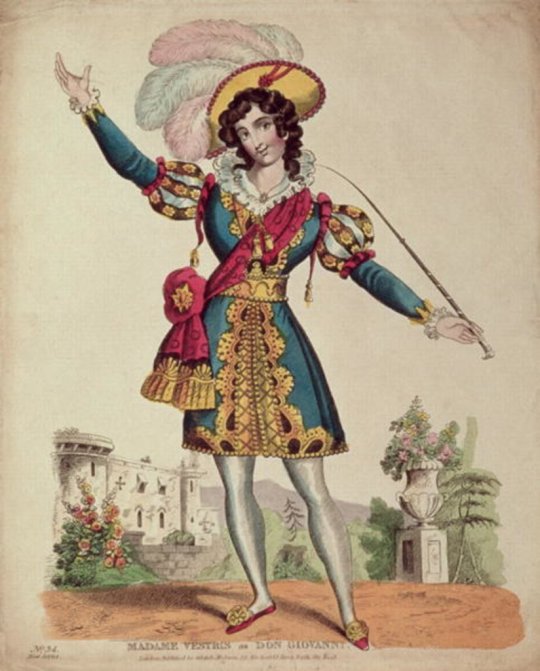
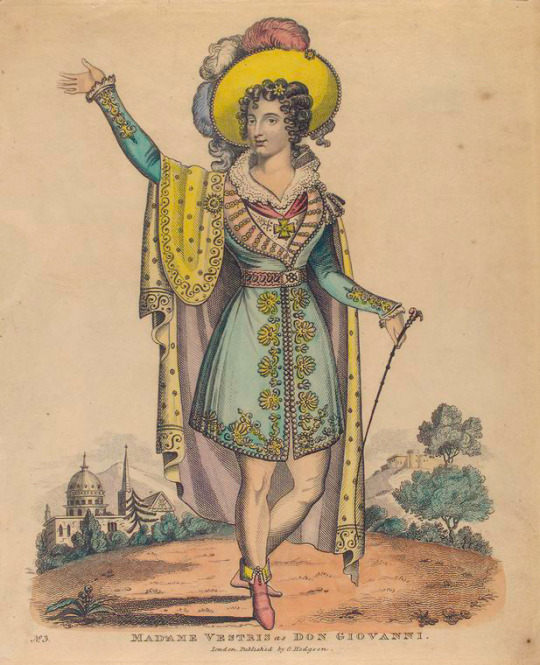
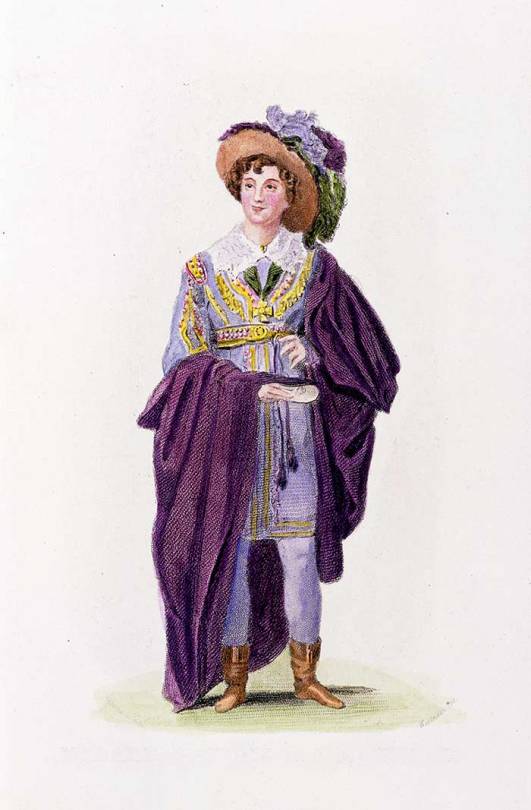
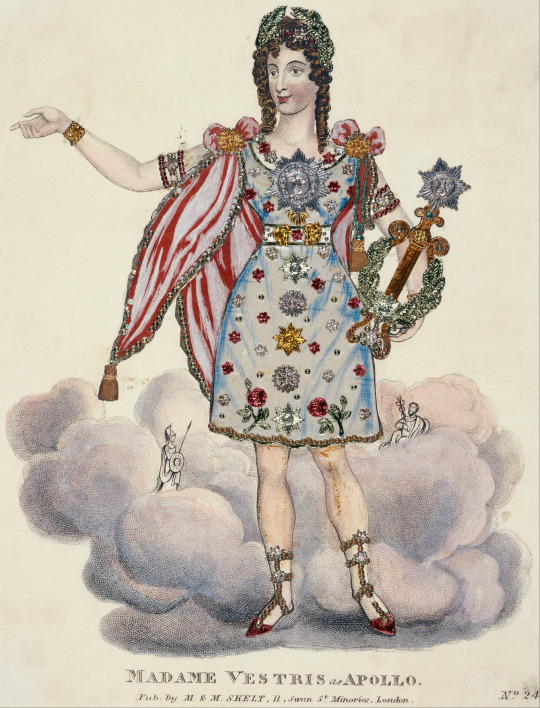
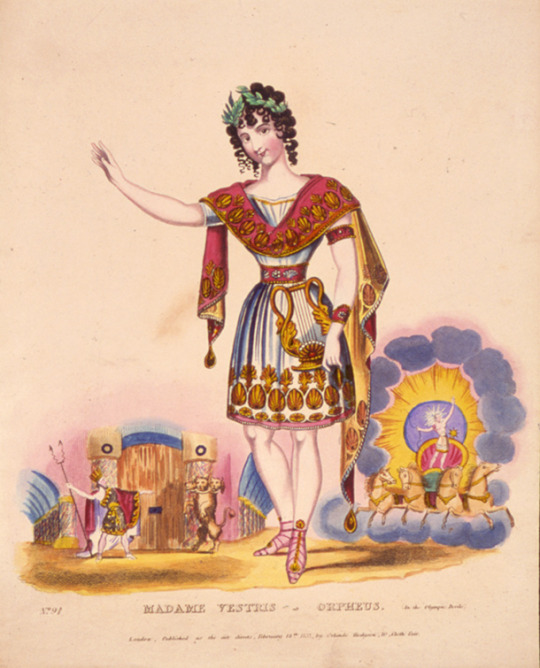

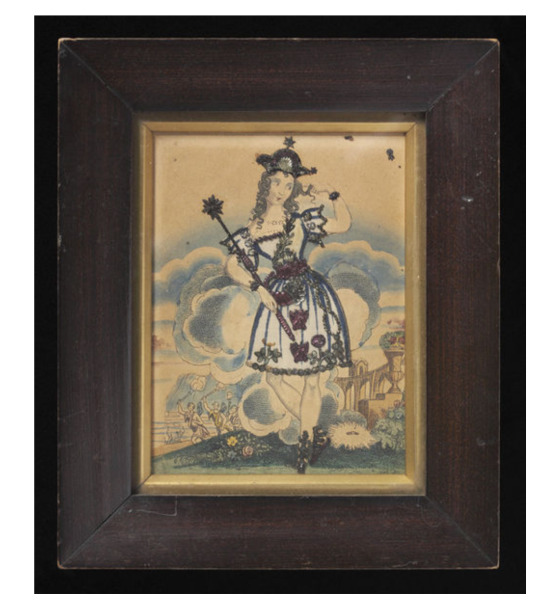
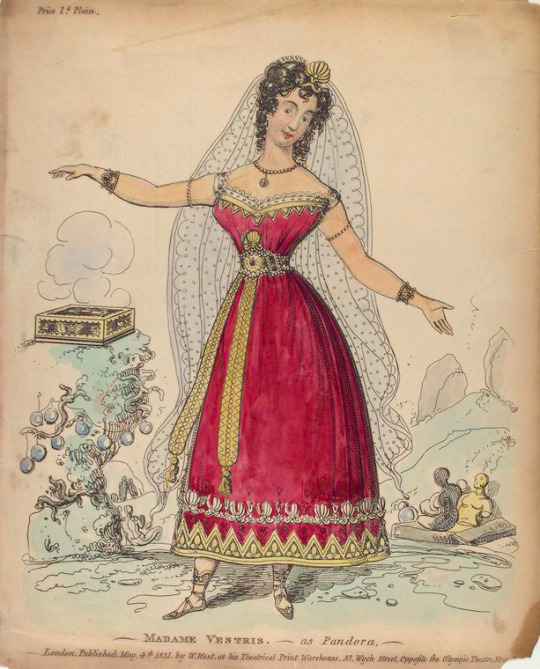
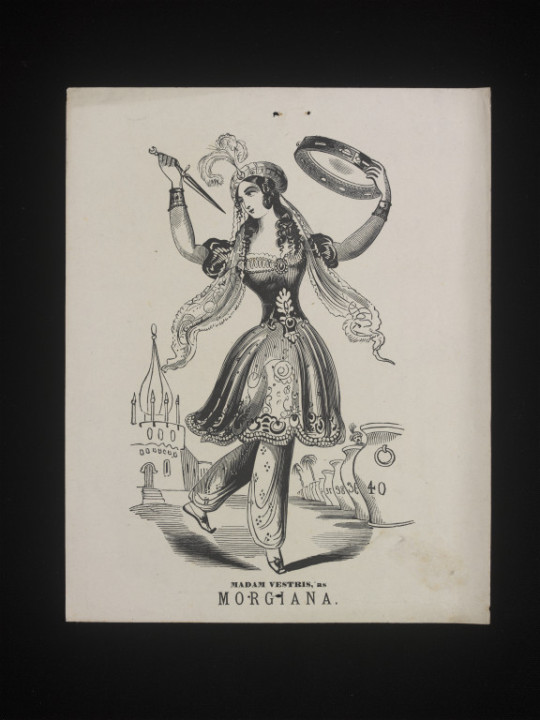
Today I’m simping for: Madame Vestris, a 19h century actress, opera singer, theatre manager and producer who famously appeared on stage in male roles (so-called “breeches“ roles):
1.+2. Don Giovanni
3. Don Felix (The Alcaid)
4. One of her many appearances as Apollo (click here for a full-res version of this tinsel print, it’s absolutely stunning)
5. Orpheus
6. King Oberon
7.+8.+9. She starred in numerous female roles as well, here she is playing Queen Titania, Morgiana and Pandora
(There are other pictures of her floating around the internet, I’ve only picked my favorite ones. The V&A Museum has a collection of her prints if you want to see more of this absolute icon <3)
0 notes
Text
off course

op cit —
verso of etching (detail, 90º ccw; inv)
ex Black Domino : A Musical Burletta in One Act, By Charles Mathews (London: Chapman and Hall, 1838), “as performed at Madame Vestris’ Royal Olympic Theatre.”
from google scan of University of Illinois at Urbana-Champaign copy
—
all tagged islands
all tagged night sky
all tagged onceings
6 notes
·
View notes
Text
Sunday, 16 February 1840
7 40/’’
12 35/’’
i.e. 7 40/’’ by the clocks here by which time we must now go – Trying to read the Russian Affiche over my door – The price of wines, &c. Donskoi at 4/- the bottle – Very fine sunny morning – Breakfast at 9 50/’’ George said when I called him at 9 to see about a Traineau that it was Reaumur -25º out of doors – Breakfast in an hour –
Out at 11 1/2 – The Traineau not quite ready but came to us at the Kremlin at 11 3/4 – Went into the 1st church – Could not see much – Full of poor people came away – Got into our Traineau and drove to the Convent des Femmes where is the famous Vierge de Kazan – The superior not at home ∴[therefore] could not see the summer church of large, handsome exterior but went into the winter church where the richly coiffed Vierge sojourns during this season –
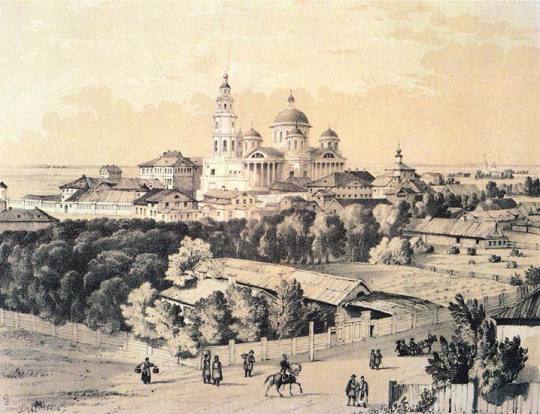
The Bogoroditsky Monastery where Anne and Ann saw the Mother of God of Kazan. Lithograph by Professor Edward Turnerelli.
Her every day coiffure = 60,000/- but her dress one = ten times that sum one diamond in it is worth 60,000/- - All this in the Trésor which we may see on application to the supérieure – The church not very lofty but well proportioned and handsome – The vaulted ceiling of the nave painted (dark blue outline) in square panels with a patera in the centre of each –
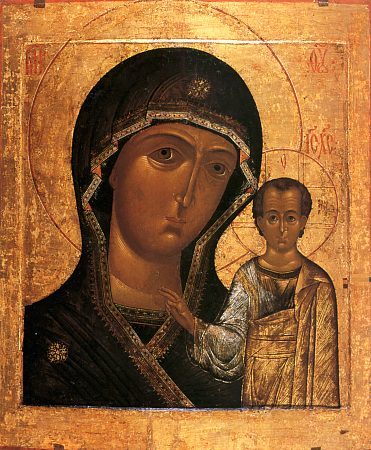
Copy of the Mother of God of Kazan. The original was allegedly stolen and destroyed.
One arcade parted off for the vestibule – 4 arcades over which a balustraded gallery for the nuns in the nave; and then the handsome dome springing from 4 large arches and close beyond this dome the iconostase and apparently the same length as the nave and vestibule, i.e. 5 arcades length, taken up by the préstole (altar) and its appurtenances – the space left all in one – Not divided as in general into 3, the middle for the altar, and the 2 rooms, one on each side, for the priests, - A sort of vestry –
Gave the nun who civilly shewed us the Virgin a ten S.[Silver] Kopek piece which seemed to be enough for the little she had done – The exterior of the wall that encloses this convent is strikingly tartar and picturesque

the curtain between each pair of broad pilasters has a pointed Equilateral Triangular battlement with a double round topped loop-hole recess under each apex i.e.
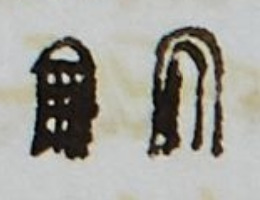
there is one recess within another – Each of about 6 in.[inches] deep – Brick work white washed – The effect of these Tartar walls and buildings depends much up these brick work recesses and mouldings, and plasterwork, and paint –
There seems to be not much left that was here in Tartar Times except an old Tower and some other building near to it that George said was a Tartar Mosque and Fort – The tower is brick – In decay – In 5 or 6 retiring grades crowned with a pyramid, very picturesque –
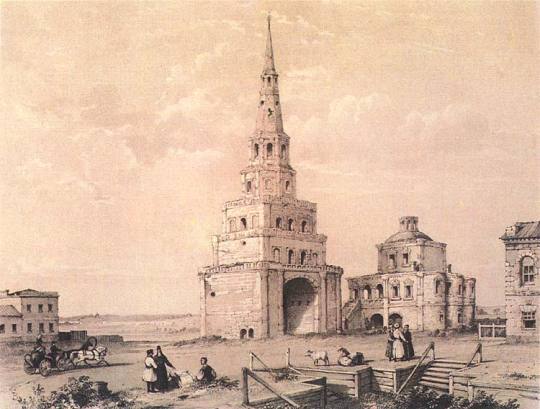
The Söyembikä Tower is likely the building Anne described, which is presented here in a lithograph by Professor Edward Turnerelli.
We then drove to a Mosque – Open – Service – Went in for a minute or 2 – Only the people – The priest not arrived – Plain and carpeted – Much the same as at Moscow, but the exterior arabesque i.e. ornamented à la Tatar – A square on arches, and mouldings about the windows and a picturesque looking building but rather cracking and seeming to want some repairs –
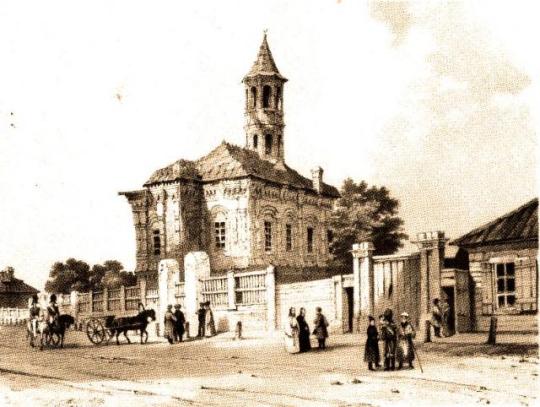
The Apanaeev Mosque, here seen in a lithograph by Professor Turnerelli, was one of the mosques in Kazan at the time Anne and Ann visited the city. The style is similar to what Anne describes, though it’s possible that this wasn’t the mosque they visited.
Then drove along the Tartar Town along the Kasanka river, and pursued its bed and drove all round that side of the Town in the bed of river for some distance – Drove under the modern square Tower built on the spot where the breach was made when the Russians took the town from the Tartars in 1552 – Interesting –
Came back to the Town up one of the deep clefts in the high sand-rock on which the Town and fort-walls are here built – Then when on the hill, turned left a little way and passed under the curves gateway to the Great Road to Perm and Siberia – Nearly opposite this gateway at a little distance is the handsome large pile of building, the military hospital, and not far off on the same side as the Siberia Gate is a church and the large cemetery of the Town – Drove a little way on this great road – But on this high ground the wind so piercing that we turned back – Nothing to be seen forwards towards Siberia but one wide plain with hardly any wood upon it –
On our return drove to the Raskolmick church a small rather Russian Greek like church of no great appearance situated in a court, and not far from the Boutanka Canal – Passed the back, the observatory part, and the long line of handsome front of the university in returning – It is a long line with a 12 columned pediment in the middle and terminated by a 6 columned pediment at each end – The street in which is the University seems long and handsome (the handsomest in the Town?) and the other good streets seem to run parallel with it –
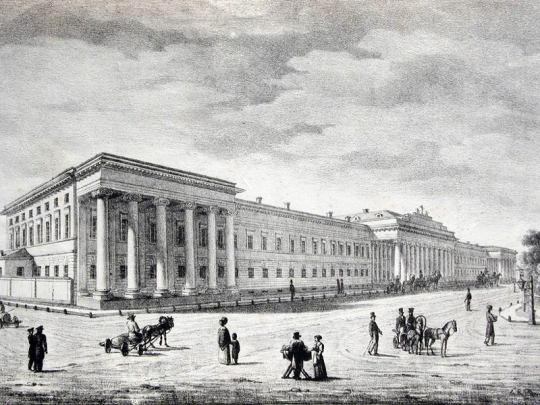
The Kazan University in 1832.
The General Governor’s House is in the University Street – But it seems Professor Eversmann’s house is somewhere near the Siberia Gate – And Madame Lapteff’s somewhere near the Convent des Femmes?
Home at 2 55/’’ – A little benumbed with the cold, against which my head not being sufficiently guaranteed, I had to hold tight the satin wadded bonnet every now and then which benumbed my hands –
Amused? With the style of countess A[Alexandrine] Panin’s letter to her cousin and copied it see the other end this book her manner of mentioning us is not the nicest? She calls A[Ann] my companion but she deserves this ssince she would not be pleased to be thought my niece the fact is she has sso little that is taking about her that they know not what to make of her especially as she is no relation princess RRadziwil once asked why I had such a person so unsuited but I passed it over and she had too much tact ever to repeat the observation I said I could not do without her she kept house for me not everyone would travel about with me and I must have someone –
At 4 1/2 sent by George Mr. Boutourline’s letter
M.[Monsieur] B-[Boutourline] À Son Excellence, Monsieur le Général, Strekeleff Aide de Camp General de S.[Sa] M.[Majesté] L’Empereur, Gouverneur Militaire de Kazan &c. &c. à Kazan.
Mr. Fischer. À Momnsieur le Professeur, d’Eversmann, à Casan. De la part, de G. Fischer.
Countess A.[Alexandrine] Panin Madame, Madame de Lapteff, à Kazan.
This letter being unsealed put it under sealed cover with A-‘s[Ann’s] card and my own – And sent A-‘s[Ann’s] and my own also chez le General Gouverneur – But merely the letter to the Professor –
Then changed my dress and had my hair done – Dinner at 5 1/4 – A diner complet Russe, pour une personne just enough for us two = 2/50 and had a bottle of Donskoi wine 4/- to drink the happy returns of the 10th inst. –
The véritable sixth anniversary we dined chez le General Gouverneur of and at Nijeni – Drank health to A-‘s[Ann’s] sister and her family and her Aunt, and Marian – And all our friends round the Wrekin – Our friends at Nijney and Prince George of Georgia – Our friends at Moscow and La Charmante Princess R-[Radziwil] our own Queen, and the Emperor and Empress and Imperial Family –The wine good – The champagne? They have given us at every dinner?
Then till now 10 1/2 (tea at 8 in about 1/2 hour) wrote the whole of today – Sat up looking at Map of Russia and the few notes I have brought – Unluckily I have left behind at Moscow all my notes from Lord Royston cum multis aliis!!! It is useless to give myself the trouble of making notes for a journey if I thus leave them –
[in the margin of the page:] Picturesque wall
Page References: SH:7/ML/E/24/0016 and SH:7/ML/E/24/0017
4 notes
·
View notes
Photo
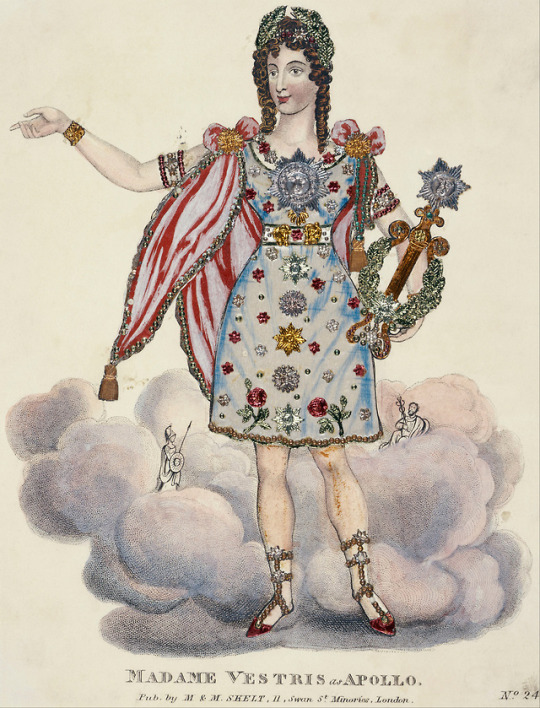
Theatrical tinsel portrait - Madame Vestris as Apollo by Martin and Matthew Skelt 1837-40.
94 notes
·
View notes
Photo
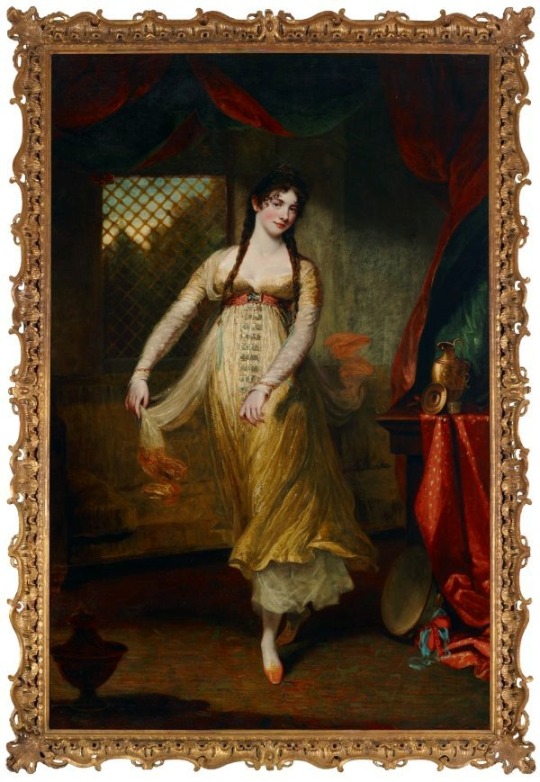
Título: Madame Hilligsberg, circa 1790-1795
Artista: John Hoppner (Inglaterra, 1758-1810)
Acerca de
Marie-Louise Hilligsberg (c1765 / 70? –1804) fue una bailarina francesa cuyas actuaciones deslumbraron al público londinense en la última década del siglo XVIII. Se formó en París con el gran bailarín y coreógrafo Gaëtan Vestris y llegó por primera vez a Londres en 1787. Se unió al King's Theatre haciendo su primera aparición en diciembre de 1787 en el ballet de Noverre 'Les offrandes à l'amour'. Hilligsberg se asoció principalmente con el King's Theatre, aunque también actuó en el Pantheon y ocasionalmente en Covent Garden y Drury Lane. Después de la temporada 1802-03 se mudó con su esposo a Francia y comenzó a llamarse la condesa de Beaumont. Sin embargo, su retiro fue breve. Probablemente murió en enero de 1804, se pensaba, como consecuencia del «esfuerzo extremo que invariablemente había realizado en su profesión».
Detalles:
Fecha: circa 1790-1795
Categoría de medios: Pintura
Materiales usados: óleo sobre lienzo
Dimensiones: Lienzo de 240,0 x 147,3 cm; Marco de 249,5 x 172,5 x 10,0 cm
Fecha de firma: No firmado. Sin fecha.
Crédito: Obsequio de Kenneth Reed 2014. Donado a través del Programa de obsequios culturales del gobierno australiano
Información de la Art Gallery NSW.
0 notes
Text
► Zoe Benson
17-year-old, girl-next-door, Zoe Benson has her life turned upside-down in an instant when her true lineage is violently revealed. Ripped from her family and the only life she has ever known, Zoe must all-too-quickly learn to navigate her strange and uncontrollable gifts.
Zoe is a witch with the uncontrollable power to cause whoever she is currently engaging in intercourse with to hemorrhage until they die. It's only upon the untimely death of her boyfriend that it's revealed that her great-grandmother shared her "curse". She is then whisked away to a school, where young witches learn to control their gifts; a school supervised by Cordelia Foxx.
Zoe is a young girl with chest-long, straight, dark blonde hair. She is seen to wear it down with a center part most of the time. She is about 5'4" with long legs and a very slim, athletic build. She has light skin and an oval-shaped face with caramel eyes. She is seen to wear very little makeup and dresses in dark colors much of the time, often times pairing a hat with her ensemble.
Zoe is a shy, quiet girl and, unlike her fellow witches, cannot remain cool under pressure, as she blurted out that she and Madison were witches when the police questioned them about the events that took place at the frat party. While the academy was under siege and, in the absences of Cordelia and Fiona, Zoe took charge, acting as a leader for Nan, Queenie, Madame LaLaurie, Spalding, and Luke, confronting zombies, and developing new powers in the wake of attacks from the Voodoo Queen and witch hunters.
Zoe plans to lose her virginity to her boyfriend, Charlie. However, in the process of having sex with him, she accidentally gives him a fatal aneurysm. Her mother explains that her great-grandmother bore the very same curse, revealing her as a witch. Soon after, Myrtle Snow and her valets retrieve Zoe and whisk her away to New Orleans to attend Miss Robichaux's Academy for Exceptional Young Ladies.
Upon entry, she is immediately subjected to a hazing by ghastly masked fellow students, Madison Montgomery, Nan, and Queenie. Afterward, the headmistress, Cordelia Foxx, gives her a tour, tracing the history of witches and instilling the importance of discretion. Zoe accompanies Madison to a college party, where she meets charming scholarship student, Kyle Spencer. They had drugged up Madison planning to rape her However, their flirtations are cut short when Kyle breaks up the gang-rape of a drugged Madison perpetrated by his frat brothers. Madison recovers enough to wreak her revenge by telekinetically wrecking the escape vehicle with them inside.
The next day, upon learning that the tragedy yielded two anonymous survivors, Zoe visits the hospital in hopes that one may be the innocent, heroic Kyle. She is disappointed to find two undeservedly living rapists instead, ringleader included. In a perverse combination of sexual desire and monstrous revenge, she finds the boy responsible for raping Madison, stimulates him, and starts to have sex with him, and he suffers her deadly curse.
Powers
Telekinesis - One of the Seven Wonders, the magical ability to move things with only the power of the mind.
Concilium - One of the Seven Wonders, the magical ability to bend the will of another individual and force them to do whatever the user desires. This power is more commonly known as Mind Control.
Transmutation - One of the Seven Wonders, the magical ability to move from one place to another without physically occupying the space in between. This power is more commonly known as Teleportation.
Descensum - One of the Seven Wonders, the magical ability to descend into the nether worlds of the afterlife. This power is also known as Astral Projection.
Vitalum Vitalis - One of the Seven Wonders, the magical ability to balance the scales between life and death.
Divination - One of the Seven Wonders, the magical ability to gain knowledge through indirect means.
Spellcraft - Zoe had an affinity for casting spells which allowed her to do a variety of feats including freeing the Axeman from the academy and resurrecting Kyle with the help of Madison Montgomery.
Black Widow - The magical ability to kill someone by causing fatal hemorrhages through sexual intercourse.
Power Negation - The ability to cancel out someone else's magic or voodoo curse temporarily. Zoe is the only individual shown to have this ability. This power was shown when Zoe was able to negate Marie's zombie spell simply by uttering the command, "Be in your nature."
Restoration Spell - The magical grafting of a body part back onto a living host. This ritual was performed by Zoe Benson to restore Spalding's tongue to his mouth.
“Infernales, curare hominem. Restitue eum ad naturam. Infernales, curare hominem. Restitue eum ad naturam. ”
Banishing Spell - An exorcism of evil spirits. Performed by Nan, Queenie and Zoe to banish the Axeman's ghost from the Academy
“Salvo Liberatsum Spirito Malus Nequam pessimus petor Cantum sufficare non levsusne milte illuc ubi mal spiritus sunt mortem cadaver putridum repraesent infur imperator requiru a choro. ”
Scrying Spell - A spell used by Zoe Benson to know what happened to Nan. Light a few white candles around a bathroom and hold a lighted silver candle above a bath tub full of water and say the incantation while touching the water. The images will then appear in the water.
“Elementum recolligo huic locus. Commodo mihi vestri vox".
Verses
tba
#American Horror Story#American Horror Story [Zoe Benson]#Female Character#non mutuals#face claim: Taissa Farmiga
1 note
·
View note
Text
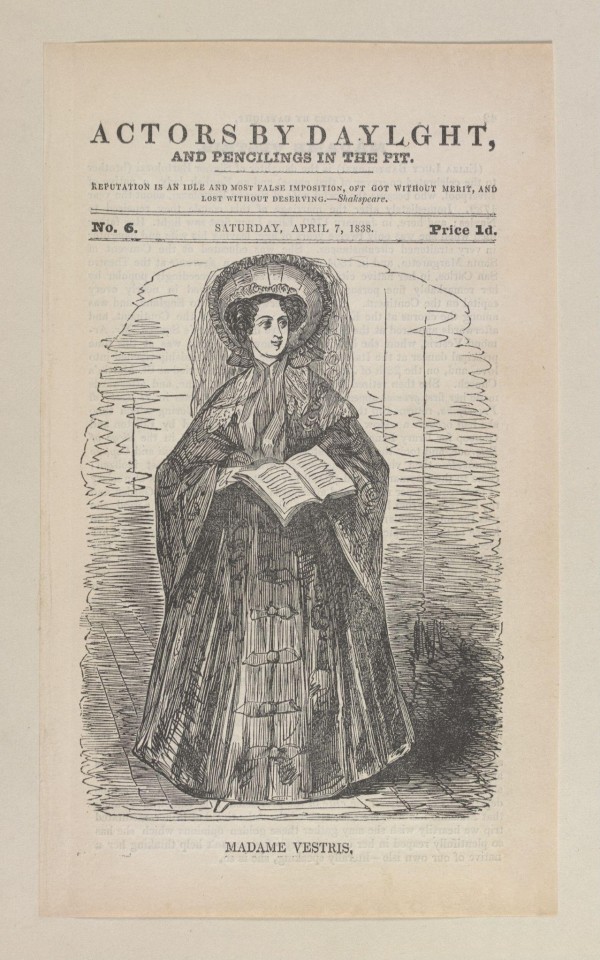
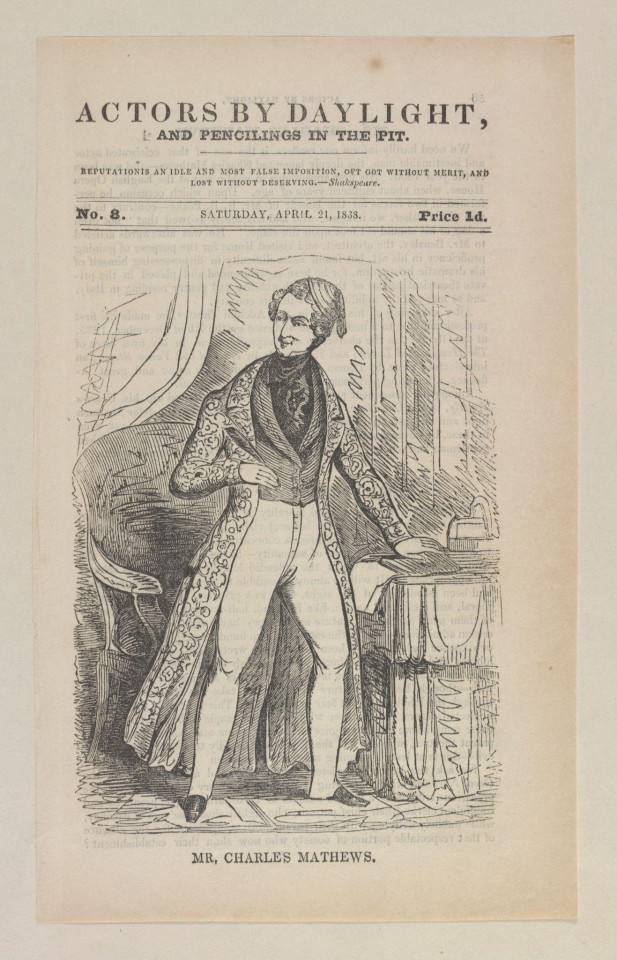
Bonus Eighteen-Thirties Thursday theatre content: what appears to be a magazine for fans of the stage (and celebrity gossip?): Actors By Daylight and Pencillings in the Pit, two 1838 editions in the Victoria & Albert Museum (April 7 1838 and April 21 1838). Featured are the actress and theatre manager Madame Vestris, and Charles James Mathews of The Humpbacked Lover fame.
I didn't realise that Madame Vestris and Charles Mathews were a married couple! (Both had other marriages). Madame Vestris kept the name of her first husband even after marrying Mathews, an understandable decision to keep her "brand" if unexpected for her time.
#Eighteen-Thirties Thursday#1830s#theatre#charles james mathews#madame vestris#actors by daylight#magazine#1838#it's cheap as heck even doing a historical currency conversion
22 notes
·
View notes
Text
Anna Cora Mowatt and Pauline at the Olympic
Anna Cora Mowatt and Pauline at the Olympic
PART XI: A PROFITABLE PERIOD OF UNEMPLOYMENT
After debuting at the Princess Theater in the winter of 1848, Anna Cora Mowatt and E.L. Davenport spent a couple months in London without working at any playhouse. This does not mean that they were not busy, though. This was a very eventful period for them during which they were actively making important connections. Mowatt even turned down a few job…

View On WordPress
#anna cora mowatt#Astor Place Riots#charles dickens#Charlotte Cushman#E. L. Davenport#edward stirling#helene faucit#Henry Spicer#John Oxenford#Lady of Lyons#Madame Vestris#Royal Olympic Theater#The Lady Actress#theater history#theatre history#theatrical autobiography#Victorian Actress#Victorian Literature#Victorian theater#victorian theatre#Walter Watts#Watts Scandal#William Macready
1 note
·
View note
Photo
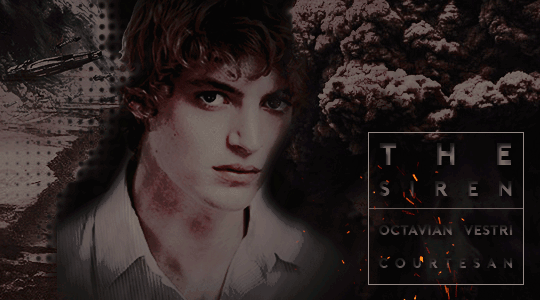
OCTAVIAN VESTRI · 24 · COURTESAN AT SEVEN HAVENS · THE SIREN · TAKEN
"Look like the innocent flower, but be the serpent beneath it.” - LADY MACBETH
ORIGIN:
Rome, Italy
TRAITS:
+ Charismatic, Practical, Protective
- Conniving, Ruthless, Cynical
BIOGRAPHY:
THIS IS THE WAY THE WORLD ENDS;
Octavian was not always spiteful, but the way of the world found what small piece of resentment that he harboured and grew it until it consumed him. That small piece may have been born at the death of his mother and father when he was but 5 years old. Wide eyed he stood, with his tiny hand in that of his older sister’s, as they scattered their mother and father’s ashes across the Tiber and he listened to her curse the radiation that had slowly poisoned them until their bodies could no longer harbour it any longer. Octavian hadn’t quite understood what had happened to them, but it had been explained to him that they wouldn’t be coming back. The only parents he ever remembered, outside of the few photos they had of the real ones, were his sister Helene and her husband, who had no choice but to raise him as their own.
He loved them both completely, and grew up in awe of them. Helene was an esteemed researchers in the medical field, and her husband an astrophysicist. By the time Marco was 7, they were imported to Colorado by Valeris Corporation to work on the Civ-Belt. Without even a word of English bar ‘hello my name is Octavian,’ he was thrust into life amongst complete strangers. His caregivers were busy most of the time, and for weeks on end he would only see them as they returned home to sleep without uttering a word to him. He began to realise that he had become a burden, and then to realise that to Helene he had always been one.
That suited him just fine, if they did not want him, he did not want them. Fiercely independent, almost to a fault, Octavian took it upon himself to find new people who regarded him as something more than an inconvenience of fate. His English gradually became better, and though he was not scientifically minded like his guardians, he was certainly growing into an intelligent young man. Exploring Colorado Springs proper, he met a whole number of interesting people - soldiers, scientists, civilians, rebels - and became fixated on learning their stories. One boy in particular, he could have listened to for hours. His name was Jasper, and his father was one of the Civ-Belt-1’s chief benefactors.
Whether it was Jasper’s patience for his developing English, or the fact that he felt like an escape from being a burden, Octavian quickly found himself falling head over heels in love with this boy who felt sometimes as if he was from different world. Months went by where Octavian spent all his time holed up in his lover’s apartment pretending like the world and his family beyond the four walls did not exist. He was so enamoured with being someone’s priority that he often did not stop and think about what kind of person he had fallen for. Jasper had hard and fast beliefs about what sort of people, namely the elite, should be allowed on the Civ-Belt and about the rebels being akin to the worst kind of criminals. He promised a naive Octavian so many things - love, influence and most importantly a life beyond the trappings of the earth when the time came for departure. Scared of another rejection from those he loved, Octavian never questioned him or argued against, preferring the safety and security of apathy and agreement.
NOT WITH A BANG, BUT A WHIMPER.
As it had seemed too good to be true at the time, it would eventually turn out as such. The closer that time crawled towards the departure of the select few bound for the Civ-Belt-1, things began to fall apart for Octavian. His sister decided she had had enough of his constant evasion and spite directed towards her and cut him off from the space on the ship that their participation on the project has allowed him as family, as Octavian had suspected she had wanted to do ever since they had arrived in Colorado.
He was not overly devastated by this development, knowing that he would ascend the stars by Jasper’s side regardless. Though he now knows that he should not have been so naive to think that he would be dealt anything but a bad hand. All the talk, the years of Jasper telling him he could not even dream of leaving earth without him, proved false when time ran out. Octavian woke one morning to find the bed empty next to him, and Jasper’s apartment eerily empty. The one person who he had loved unconditionally had seemingly not spared him a thought when it came to his own survival. It took a few days for Octavian to admit to himself that he had been left - presumably Jasper’s parents’ rhetoric of elitism had finally gotten to him - and proceeded to destroy everything Jasper had owned in a hazy blur of anger, resentment and desperation. Once again, Octavian was alone. This time, he would make sure it was for good.
The concept of having to survive the rest of his life on earth was one he had never thought about. He managed to survive for a little while on his own, but he knew it was nothing he could maintain. He was on his own, unprepared for this life, and unable to move past the blows he had been dealt. Stealing became his only means of survival, and using the pickpocketing skills he had acquired as a child amongst the crowded streets of Rome and then again in the halls of NASA, he managed to keep himself alive. That was, until he stole from the wrong person - a man twice his size with a rusty blade that had caught him in the side as he attempted to make off with his wares. The offending merchant left him to die of the wound rather than exerting the effort it would take to pursue him as he ran. The wound quickly became septic; Octavian could barely move before too long, though through the knowledge of medicine he had picked up from his sister over the years, he knew what he needed to stop the spread of the infection. The only place he knew where to get such rarities was the one place he had resolved to stay away from at all costs.
The glint in Madame Sellgraves’ eyes when he had walked through her door would haunt Octavian for the rest of his life. He had been willing to do anything, to give anything, to not waste away at the hands of his own naivety, and the Madame had been more than willing to take. Calloused hands that reminded him of the claws of a vulture had taken hold of his chin, making his skin crawl as she as she tipped his face so she could regard him at every angle. The claws had even bunched his golden curls in order to tip his chin upwards. He hadn’t needed words from her lips to understand what the price for saving his life would be, and he had accepted the deal within seconds. The decision was easy when there were no other options.
Octavian was eventually cured of the infection thanks to the medicine he had sold his body to obtain, and with it, his naivety was cured to. The day he entered Sellgraves’ tent, he left whatever little softness was left in him at the door. To survive in the life he had signed himself into he knew he had to be ruthless, cunning and a nightmare so beautiful that his victims would never see what they had coming. He has been at the brothel for a long time now, and has his doubts that he would have survived anywhere else this long. Though the life he leads may seem nightmarish, he had resigned to maintain apathy about his situation. It is a small and humble place he has carved himself in the world, but a place nonetheless.
FACECLAIM:
Niels Schneider
2 notes
·
View notes
Text
Michael William Balfe, Irish composer and conductor 15th May
Michael William Balfe (15 May 1808 – 20 October 1870) was an Irish composer, best-remembered for his opera The Bohemian Girl.
After a short career as a violinist, Balfe pursued an operatic singing career, while he began to compose. In a career spanning more than 40 years, he composed at least 29 operas, almost 250 songs and other works. He was also a noted conductor, directing Italian Opera at Her Majesty's Theatre for seven years, among other conducting posts.
Balfe was born in Dublin, where his musical gifts became apparent at an early age. He received instruction from his father, a dancing master and violinist, and the composer William Rooke. His family moved to Wexford when he was a child. Between 1814 and 1815, Balfe played the violin for his father's dancing-classes, and at the age of seven composed a polacca.
In 1817, he appeared as a violinist in public, and in this year composed a ballad, first called "Young Fanny" and afterwards, when sung in Paul Pry by Madame Vestris, "The Lovers' Mistake". In 1823, upon the death of his father, the teenaged Balfe moved to London and was engaged as a violinist in the orchestra of the Theatre Royal, Drury Lane. He eventually became the leader of that orchestra. While there, he studied violin with Charles Edward Horn and composition with Charles Frederick Horn, the organist, from 1824, at St. George's Chapel,
While still playing the violin, Balfe pursued a career as an opera singer. He debuted unsuccessfully at Norwich in Carl Maria von Weber's Der Freischütz. In 1825, Count Mazzara took him to Rome for vocal and musical studies and introduced him to Luigi Cherubini. Balfe also pursued composing: in Italy, he wrote his first dramatic work, a ballet, La Perouse. He became a protégée of Rossini's, and at the close of 1827, he appeared as Figaro in The Barber of Seville at the Italian opera in Paris.
from Blogger https://ift.tt/2Id0JJd
0 notes
Photo
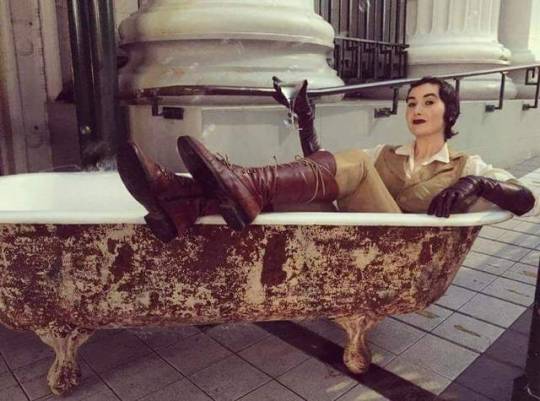
MADAME VESTRIS - MISTRESS OF CEREMONIES.
EXPLORER COSTUME - Designed for Hendrick’s Gin and Glory Days Events
0 notes
Text
When We Were Young Part Four
Previous Part | Next Part | Masterlist
Pairing: Sherlock Holmes x Reader
Rating: T
Notes: Not beta-read
I hope everyone's had a good week and is doing well :) Thank you for all of the likes/reblogs/replies!!
Warnings: Uuuuuh none
Summary: “I’ve never come across a boring case, Lord Dawson. Some have perhaps been easier to solve than others, but the truth is never boring.”
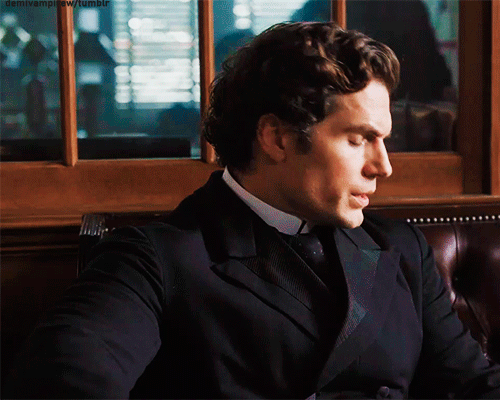
“You seem a little agitated, if you don’t mind my saying so.”
You did mind her saying so, but you couldn’t bring yourself to be irritated with Mrs. Lloyd. She was Uncle Cornelius’ housekeeper, had known you since you were very young, and was familiar with your moods.
“I’m not particularly looking forward to this evening,” You excused. Mrs. Lloyd glanced at you in the mirror as she adjusted the off-the-shoulder sleeves of your royal blue evening gown.
“Could it have anything to do with the fact that Lord Dawson will be in attendance?” She asked.
“Among other things,” You replied stiffly. She hummed, lifting her hands to smooth over your hair.
“Shall I tuck a flower into the braid? I got a lovely bunch of gardenias at the market this morning,” Mrs. Lloyd offered. She didn’t wait for your answer before she headed for the door.
“Why gardenias?” You asked, turning to look at her.
“They symbolize purity and gentleness,” She told you. You grimaced.
“Are there any flowers that symbolize resentment?” You asked. Mrs. Lloyd frowned.
“Petunias. But I didn’t buy any of those.”
--
“It’s the last thing this country needs, reform,” Mycroft had been prattling on for nearly twenty minutes now. Most of the men’s voices uttered murmurs of agreement, though you noted Sherlock’s was absent. You glanced in his direction to find him eyeing the man that had been seated across from you.
Lord Fredrick Adelbert Dawson did cut a fine figure, you couldn’t deny it. With a sharp, pointed jaw, dusty blonde hair, hawk-sharp steel blue eyes, and an aquiline nose, he tended to draw the eye of many a young lady. He had even drawn yours when you’d first met him. And then you’d had a conversation with him and any interest you’d had faded quickly.
You lowered your eyes to your plate as you saw Sherlock’s gaze flit to you.
“Come now, gentlemen, I do believe we’re boring our companions,” Cornelius chuckled, casting looks around the table, “Perhaps Mr. Holmes could tell us about the case he’s currently working on?”
You felt yourself grow tense as everyone’s attention shifted to Sherlock. If he was rattled by this sudden spotlight, he didn’t show it. His face retained its usual mild expression; the only noticeable change was a now quirked brow in Cornelius’ direction.
“What is it you’d like to know?” He asked.
“Whatever it is you can tell us,” Cornelius pressed.
“I’m not sure there’s much Sherlock can say about this one at present,” Mycroft’s voice was tight as he reached for his glass of wine. You watched him take a rather long sip before he lowered the glass to the table. The hand that had been holding it rested on the cloth, balled into a fist.
“Is it because it’s confidential, or is it simply dreadfully boring?” Lord Dawson asked. You cast Sherlock a glance, watched him tip his head and narrow his eyes at the question. Oh dear.
“I’ve never come across a boring case, Lord Dawson. Some have perhaps been easier to solve than others, but the truth is never boring.”
“The truth?” Dawson repeated, brows raised in amusement, “What excitement can one find in the truth?”
“About as much excitement as you find at the Theatre Royal in Covent Garden. Is it still under the management of Madame Vestris?”
“Sherlock,” Mycroft hurried to hiss from the other end of the table. But the damage had been done. You watched as the blood drained from Dawson’s face. The comment had landed with the other gentlemen at the table, and, unfortunately, with you. Uncle Cornelius, in one of his more intoxicated states, had once made mention of ‘the pretty ladies he’d been in the company of’ at the Theatre Royal. You weren’t naïve; you knew that they were ladies of the night.
You reached for your glass of wine, avoiding the eyes of both Sherlock and Lord Dawson as they looked to you for a reaction.
“I quite loved H.M.S. Pinafore!” Cornelius piped up in the hopes of breaking the tension.
--
After dinner, the ladies had adjourned to the sitting room for a glass of wine and some conversation; the men had remained in the dining room for brandy and cigars. You had only been able to stand the chatter for a few minutes before you excused yourself.
You stepped out into the garden, sighing into the night air and allowing your shoulders to sag just a little. Dinner had been no less than a disaster. Even after Cornelius had moved the conversation on, there had been glares and harsh words veiled as polite conversation between Sherlock and Dawson. You had hated it; you knew that this would be awful, but you couldn’t have fathomed it would be nearly this bad.
“Are you cold?”
You jumped at the sound of his voice. Sherlock held his hands up in apology as you brought your hand up to your chest, feeling your heart pound.
“No,” You lied, the word harsh in your irritation. If he knew you were lying, he didn’t call you on it. Sherlock turned, beginning to wander around the garden in silence. You rubbed your hands over your arms, trying to warm them as he was looking elsewhere. As you saw him turn back toward you, you quickly lowered your hands, clasping them in front of you.
“What are you doing out here?” You asked.
“I wanted some air,” Sherlock excused.
“There’s plenty of air inside.”
“And you?” Sherlock asked, “What drew you out?”
“... It was too warm in the sitting room,” You fibbed. Sherlock hummed, clearly unconvinced before he began to wander the garden again.
“Did they teach you to lie at finishing school?” He had meant it to be a joke, but you nodded and said, “In a way.” His brow furrowed.
“Explain,” He requested.
You looked down at your hands, considering.
“Well... You’re taught to comport yourself according to the rules of society. How to sit, how to eat, how to smile, how to speak, how to laugh. And you’re taught to act that way regardless of however you may truly be, or however you may feel. You learn to become someone else, for the sake of society...Though everyone tells you that it’s for your own sake.”
When you looked at Sherlock, you found him watching you closely.
“...Promise me you’ll find Enola before Mycroft does,” You pleaded softly. His mouth turned down in irritation.
“I’m doing everything I can, dove,” Sherlock swore.
“If you were doing everything, you wouldn’t be taking breaks to ruin dinner parties,” You retorted. Sherlock grunted, turning away from you.
“Your Lord Dawson is quite the character,” He commented. The butterflies in your stomach began to swirl about in an uneasy flurry.
“How so?” You asked.
“Well, he’s quite blunt, firm in his opinions. He seems to be under the impression that you’re meek, soft...Though maybe that was the fault of the gardenia,” he glanced back at you. You let out an irritated huff, reaching up and yanking the flower that Mrs. Lloyd had put in your hair out, tossing it on the stone bench near you. You glowered at the sight of Sherlock’s amused smile.
“I’m sure Mycroft will be quite cross with you for what you said to Fredrick,” You commented.
“Fredrick?” Sherlock repeated, stopping in his place, a thread of incredulity in his tone. You arched a challenging brow, silently daring him to comment on the name further. Rather than press, Sherlock said,
“I’m sure Mycroft is already taking the pains to smooth things over. You’re familiar with Dawson, do you think he’s amenable?”
“Your brother has a reputation for being persistent to the point of ruthlessness. I’m sure his success is imminent.”
“I wasn’t asking you about my brother,” Sherlock pointed out. He tucked his hands behind his back, regarding you.
“...Could you be happy with him?”
The question took you aback, but your answer was prepared - it was the same thing you’d been telling yourself for months: “My family would stop worrying about my future. It would be a weight off of their mind, and therefore mine.”
“That isn’t an answer.”
“Yes it is,” You argued. Sherlock considered this.
“I disagree,” He finally said, “Let me ask again.”
He began to cross the garden toward you in slow, steady steps as he spoke,
“Would you be happy, being Lady Dawson? Attending opening day at Ascot? Wearing the latest fashions? Having your name in the papers whenever your husband takes up another of his several affairs?” Your stomach churned uneasily, heart pounding as Sherlock stared you down.
“Stop it,” You mumbled.
“Bearing two, three little lords or ladies? Shipping them off to school--”
“Stop it!” You snapped more loudly. Sherlock went still at that, close enough for you to see the flicker of shock in his eyes. You shook your head a little bit, squeezing your eyes shut for a moment to quell the tears that had begun to prickle, taking a deep breath to steady yourself before you looked at him again.
“You’re just as bad as Mycroft sometimes, you know? Prodding me to see how quickly you can get a rise out of me like I’m some experiment and not a person. It’s cruel.”
Then you saw it again - the flash of hurt that had crossed Sherlock’s face back at Ferndell. But it didn’t disappear this time. Instead it settled, twisting his handsome features as his eyes lowered to the ground.
“You did it when we were young, too. Maybe it was fair then, maybe I was just this irritating noise-making thing that you wanted away from you. But we’re not children anymore,” You reprimanded him, “And what I may have to do to maintain my family’s social standing is none of your concern, Mr. Holmes.”
Sherlock looked at you then, eyes skating over your face before he met your gaze.
“Your eyes are red,” He said. Irritation shot through you.
“I’m not a case, Sherlock,” You sneered before you turned away, intending to leave. Sherlock’s hand caught hold of yours, stilling you.
“Let go,” You hissed.
“Dove.”
His tone was beseeching, gentle. You didn’t trust it.
“Let go of me,” You demanded. He did, and you strode away, leaving him alone in the night.
--
“Are you alright? ... My dear, you’re shaking,” Mrs. Lloyd gripped you by the shoulders, steering you back into the study.
“I-- It was colder than I anticipated,” You excused. You allowed yourself to be steered into a chair by the fire, folded into a blanket, the others fussing about you catching your death. No one noticed the gardenia missing from your hair.
No one noticed the white petals peeking out from the pocket of Sherlock’s jacket as he bid Cornelius a good night.
--
“Breakfast is on the table. And there’s been a delivery for you - it’s in your study,” Your mother informed you.
You thanked her quietly before turning back to your vanity to finish pinning up your hair.
You were glad to be home. Your last two days in London had been entirely uneventful. You’d met with your father’s other investor (with minimal condescension; the gentleman had actually been somewhat pleasant) and dropped in on your aunt one more time before traveling home. You hadn’t heard from Dawson, which was a relief.
You’d heard nothing from Sherlock. That should’ve been a relief, but it was, in fact, agonizing. You told yourself it was because it meant that you had no news of Enola, but you knew that it was more than that. You couldn’t help but wonder what the two of you may’ve said or done if you’d turned back to him when he’d wanted you to. You hadn’t sought him out despite this curiosity, either in person or by post; he had a case to work on. Besides, you didn’t know what you’d say to him even if you did see him. You two seemed to turn to bickering when left to your own devices.
Your curiosity about the delivery won out over your hunger, and you went into your study. There was a beautiful white satin glass vase sitting on your desk filled with purple hyacinths.
You knew what those flowers meant well enough - you’d sent them to your Aunt Mary the last time you’d failed to send her a formal thank you note for a dinner party you’d attended at her home. Purple hyacinths were for apologies. You stepped closer to them warily, gently fingering the petals. Your eyes fell to the envelope beside the vase, and your stomach gave a little flip.
Sherlock’s handwriting hadn’t changed after all this time; his penmanship had always had a crisp, almost tight quality to it. You picked the envelope up, pulling the note out.
Please forgive me, dove.
-S.H.
At the very bottom of the note was an address for Miss Harrison’s Finishing School.
Tag list: @run-through-wa11s ; @thefallenbibliophilequote ; @bitchy-witchy-post-mortem ; @maan24 ; @awkward-walking-potato ; @madalore ; @alexa-lightwood-blog ; @chelseaxaz ; @marwritesgood ; @runawayolives ; @parkerismybaby
#When We Were Young#Sherlock Holmes x Reader#Sherlock Holmes x You#Sherlock Holmes Imagine#Sherlock Holmes Henry Cavill#Sherlock Holmes/You#Sherlock Holmes/Reader
548 notes
·
View notes